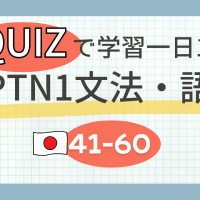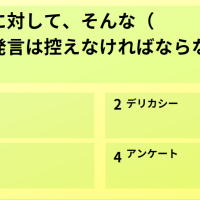![]()
~がる ~がって ~がっていました JLPT N3 grammar
to really want/ to strongly desire/ to feel strongly ~(third person)
“~がる” is used when a person’s feelings are expressed by his or her manner or speech. We normally do not use this expression when talking about our own feelings.
Vたいーーーーーーー→
いadj(い)ーーーー→ + [ がっている / がる
嬉しい 嬉しがる / さみしい 寂しがる (全部のい形容詞に使えるわけではない:一部のい形容詞にだけ使える)
なadj(な)ーーーー→
嫌(いや)な 嫌(いや)がる (全部のな形容詞に使えるわけではない:一部のな形容詞にだけ使える)
Examples :
JLPT 4
Tommy really wanted to get a Japanese game.
トミーは にほんの ゲームを ほしがって いました。
トミーは日本のゲームをほしがっていました。
JLPT 4
My grandmother who lives in Vietnam really wants to come to Japan.
ベトナムにすんでいる 私の おばあさんが 日本に きたがって います。
ベトナムに住んでいる私の おばあさんが 日本に来たがっています。
JLPT 4
If you really hate studying Japanese Kanji, your Japanese won’t improve.
かんじの べんきょうを いやがっていると、日本ごが じょうずに ならないですよ。
漢字の勉強をいやがっていると、日本語が上手にならないですよ。
JLPT 3
Even if my son really wanted to play football, I would not let him, except on weekends.
むすこが どれだけ サッカーを したがっても、 しゅうまつにしか させません。
息子がどれだけサッカーをしたがっても、週末にしかさせません。
JLPT 3
All the workers really want to go home because they have been forced to work overtime every day.
ざんぎょう(残業)がつづいて(続いて)、しゃいん(社員)はみな、家にかえりたがっている。
残業が続いて、社員は皆、家に帰りたがっている。
JLPT 3
My girlfriend really wanted to get a $30,000 engagement ring, so I gave it to her yesterday.
かのじょが 300まんえんの こんやくゆびわを ほしがったので、きのう プレゼントしました。
彼女が300万円の婚約指輪を欲しがったので、きのうプレゼントしました。
JLPT 3
(The case: I hadn’t seen my former teacher in a long time, and when I saw him, I said, “Everyone else really wanted to see you, too.”
じょうきょう: ながいあいだ あえなかった むかしのせんせいにあったとき
「みんなも せんせいに あいたがって いましたよ。」 と わたしは つたえた。
状況: 長い間会えなかった昔の先生に会った時、
「みんなも先生に会いたがっていましたよ」 と 私は 伝えた。
JLPT 2
My daughters really want dogs, but my wife doesn’t like dogs.
むすめたちは いぬを かいたがって いますが、わたしのつまは いぬが にがてです。
娘達は犬を飼いたがっていますが、私の妻は犬が苦手です。
JLPT 2
If you smoke on a train, everyone will really hate you.
でんしゃのなかで たばこをすうと、ひとに いやがられます。
電車の中で たばこを吸うと、人に嫌がられます
JLPT 2
My girlfriend really wanted to go to the fireworks show last summer.
かのじょは きょねんの なつ はなびたいかいに いきたがった。
![]()
”がり” is a noun meaning that the person often feels a certain way, such as in “あつがり(暑がり)”, ”さむがり(寒がり)”, ”こわがり(怖がり)”.
JLPT 3
I am sensitive to cold.
わたしは さむがりです。
私は寒がりです。
JLPT 3
I’m worried my daughter studying abroad, because she hates to feel lonely.
むすめは さびしがりですから、りゅうがくに いかせるのは しんぱいです。
娘は淋しがりですから、留学に行かせるのは心配です。
JLPT 2
Actually, people who pretend to be tough are usually weak.
つよがりなひとほど、じつは よわい。
強がりな人ほど、実は弱い。











 Yukiko
Yukiko









